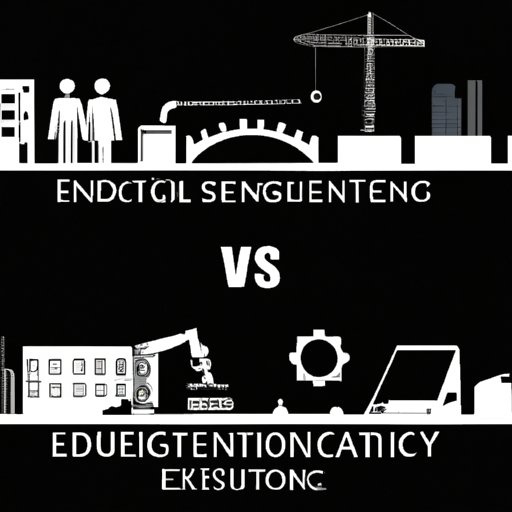Introduction
Engineering and science are two disciplines that often overlap but possess their own distinct characteristics. Understanding the differences between engineering and science can help us better appreciate the roles they play in society, as well as their impact on advancing technology. To begin our exploration of engineering and science, let’s first define each term.
Definition of Engineering and Science
Engineering is a profession that involves applying scientific knowledge to design and create solutions to real-world problems. Engineers use mathematics, physics, and other sciences to develop systems, structures, and machines that fulfill specific needs (American Society for Engineering Education, 2018).
Science is an organized method of discovering and learning about the natural world. Scientists observe, experiment, and ask questions to understand how things work and what causes them to happen (National Science Foundation, 2019).

Exploring the Differences Between Engineering and Science
Now that we have established definitions for engineering and science, let’s further explore the differences between the two disciplines.

Engineering vs. Science: A Comparative Analysis
The roles of engineering and science in society can be compared in several ways. For example, engineers focus on creating solutions to real-world problems, whereas scientists seek to understand the natural world. Engineers apply the knowledge gained from scientific research to create new technologies, products, and processes, while scientists conduct research to uncover new principles and theories. This distinction has led to the popular saying “science discovers, engineering applies” (Udacity, 2017).
The Role of Engineering & Science in Society
In terms of society, engineers are responsible for designing and constructing the infrastructure that supports our everyday lives, from bridges and roads to electricity networks and communication systems. They also create the products and machines that make our lives easier and more efficient, such as computers, cars, and medical devices. Scientists, on the other hand, provide the knowledge necessary to develop these technologies and products. By researching and understanding the natural world, scientists generate data, models, and theories that inform engineering decisions and help to shape the direction of technology development.
How Engineering & Science Differ in Education
The educational paths of engineering and science also differ significantly. Engineering programs typically involve courses in mathematics and physics, as well as design and analysis courses. Students learn to apply this scientific knowledge to practical problems and develop problem-solving skills. Science programs, on the other hand, tend to focus heavily on laboratory research and the acquisition of data. Students study the natural world and develop critical thinking skills to interpret and analyze results.
Examining the Intersection of Engineering & Science
Despite the distinctions between engineering and science, there is significant overlap between the two disciplines. Many engineers rely on scientific knowledge to develop new technologies, while many scientists use engineering techniques to conduct research and build experiments. In addition, many universities offer interdisciplinary programs that combine engineering and science, allowing students to gain expertise in both fields.
Applications of Engineering & Science
The applications of engineering and science are far-reaching and can be seen in virtually every aspect of modern life. Engineering and science are integral to the development of new technologies, from medical advances to renewable energy sources. Engineers use scientific knowledge to design and construct buildings, bridges, and other infrastructure, while scientists use engineering techniques to create tools and equipment for research and experimentation.
Varied Applications of Engineering & Science
The applications of engineering and science extend beyond technology development. Engineers are employed in a variety of industries, from manufacturing and construction to finance and business. Scientists can be found in fields ranging from agriculture and medicine to astronomy and geology. Both disciplines are essential to the advancement of society and are vital to the economy.
Investigating the Impact of Engineering & Science on Technology Advancements
The contributions of engineering and science to advancing technology cannot be overstated. According to a report by the National Academy of Engineering, “Engineering has been the driving force behind most major technological advances in the last century” (National Academy of Engineering, 2013). Similarly, scientific discoveries have enabled engineers to design and construct increasingly complex and powerful technologies. The symbiotic relationship between engineering and science has allowed us to make remarkable progress in areas such as medicine, transportation, and communications.
Conclusion
In conclusion, engineering and science are two distinct yet intertwined disciplines. Engineers use scientific knowledge to develop solutions to real-world problems, while scientists seek to understand the natural world. Despite their differences, the two fields intersect in many ways and make vital contributions to advancing technology. From medical breakthroughs to renewable energy sources, the combined efforts of engineers and scientists have enabled us to make remarkable progress in a variety of fields.
Summary of Key Points
In summary, this article explored the differences between engineering and science, focusing on the roles they play in society, how they differ in education, and their varied applications. We discussed the importance of both disciplines in advancing technology and the intersection of engineering and science in developing new products and solutions.

Final Thoughts on the Differences Between Engineering and Science
To truly appreciate the power of engineering and science, we must recognize the unique contributions of each field. While engineers focus on creating solutions to real-world problems, scientists strive to uncover new principles and theories. By combining the expertise of both disciplines, we can continue to make remarkable advances in technology.
(Note: Is this article not meeting your expectations? Do you have knowledge or insights to share? Unlock new opportunities and expand your reach by joining our authors team. Click Registration to join us and share your expertise with our readers.)
